Aug 7, 2024
Old horses, new adventures: The journey of Heljar frá Stóra-Hofi and Silvia Ochsenreiter-Egli
Heljar is a 21 year old stallion still competing in top level competitions. Silvia give us insight into training horses into old age.
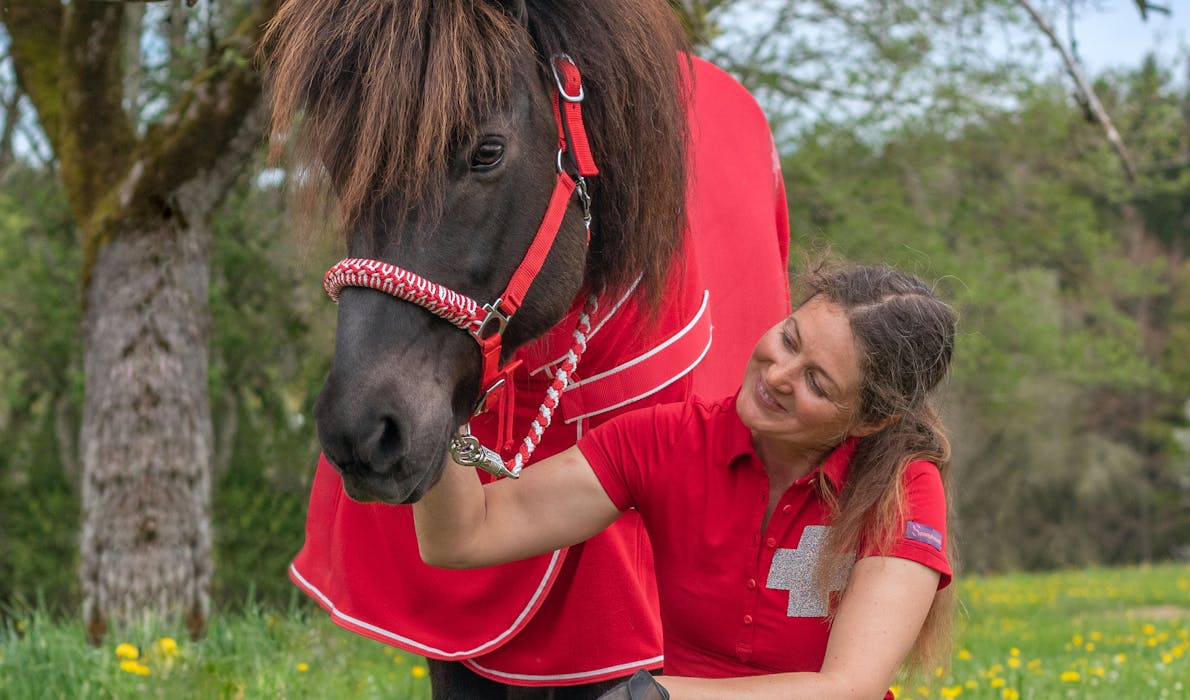
Photo: Marie Conen
Silvia Ochsenreiter-Egli is a Swiss rider who has had a lot of success over the years. Today, she shares with us her experiences with Heljar frá Stóra-Hofi, her 21-year-old Icelandic horse. The stallion has had many years of top-level sport performance but still enjoys excellent health.
How did they achieve this? Healthy older horses need varied training, patience, and horse-friendly practices. Silvia talks about how to appropriately assess the aging of horses and her plans for their retirement.
Dear Silvia, how old is Heljar, at which age did you buy him and how many competition seasons have you started together?
Heljar was born in 2003, so he turns 21 this year. I met Heljar in Iceland in 2009 when he was six years old. He hadn’t been introduced to competitive sports yet but he showed great potential. Since he resisted a fast career as a riding horse in Iceland and displayed a lot of character, I was able to acquire him at a very fair price. I took my time with him as he often stopped abruptly when he felt insecure or spooked, which happened quite frequently in the first two years. I designed the training to be very varied and gradually gained his trust.
His achievements are remarkable. He has been Swiss Champion in the five-gait (F1) category six times, including four consecutive wins, the latest in 2023. He has been a Vice Swiss Champion in the five-gait (F1) category five times, and was bronze medalist in 2024. Heljar is a two time Central European Champion in five-gait (F1) and five-gait combination. He has represented the Swiss Team at the World Championships five times, achieving several top-ten placements. Our best result was 5th place in the five-gait combination category at the 2023 World Championships in Oirschot. In 13 years, we have competed in the Sport A five-gait category a total of 54 times, with an average score of 6.89 points in preliminary rounds. I’m particularly proud of this consistency, as it shows how we are in harmony. 2024 is our 14th competition season.
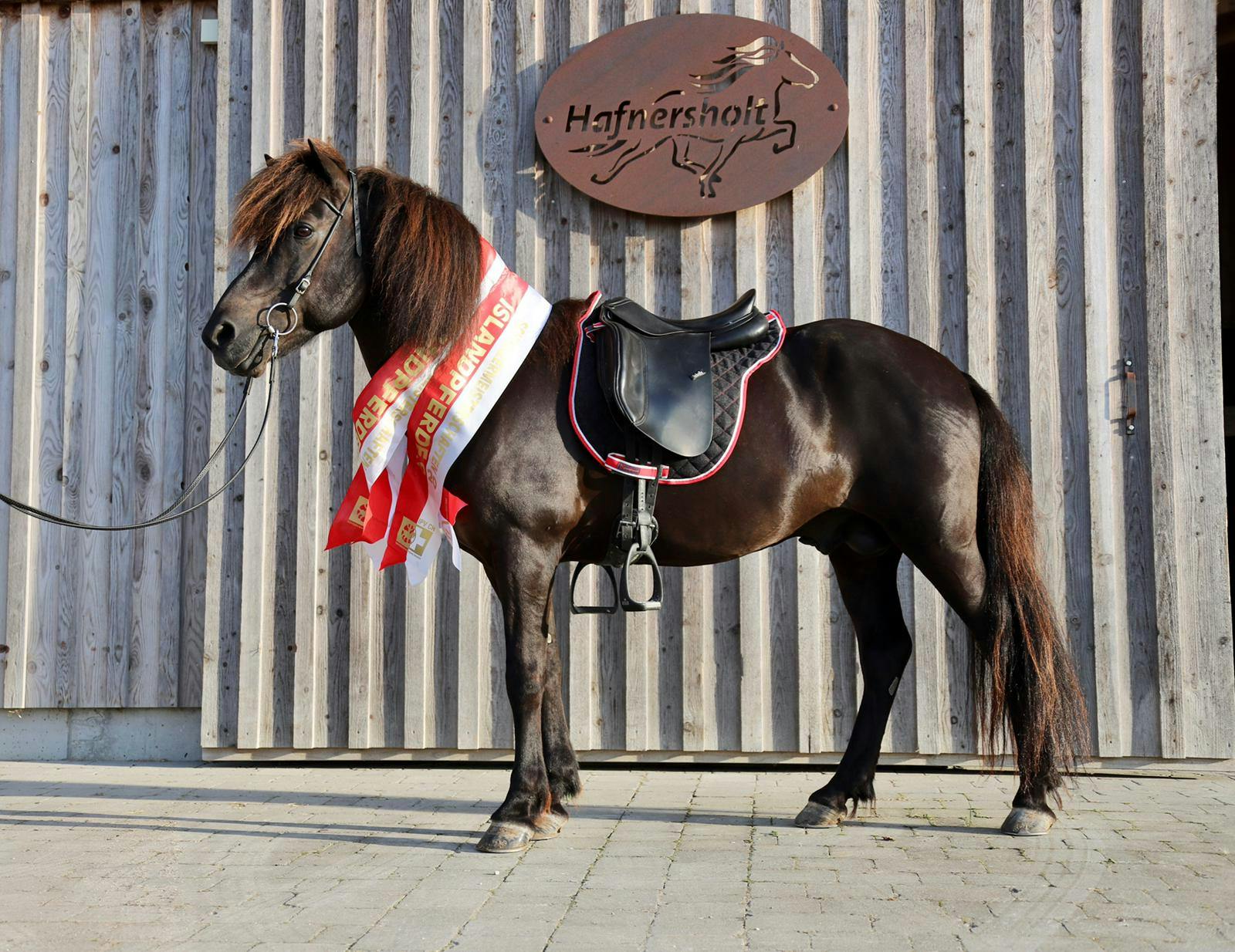
Photo: Marie Conen
Have you ever taken a year off, perhaps because he was sick or injured?
No, we have actually been able to stay active every year without any significant injuries, and have never withdrawn from a competition. In 14 years, he was briefly ill with fever twice, once after a German Championship, and once he suffered from colic, which fortunately didn’t require any surgery.
We were able to admire Heljar in all his glory at the World Championships last year. It is exceptional for horses to still compete at this age. What do you attribute his excellent condition to?
Heljar has excellent genes, very good teeth, and always enjoys eating; no matter how many thousands of kilometers we have traveled together. He feels comfortable almost everywhere and is very undemanding. Of course, I have always taken good care of him and have tried never to push him to do something he wasn’t physically or mentally ready for. Initially, I was often ridiculed for this approach. I have heard trainers saying things like, “Push him harder, he’s just stubborn, don’t let him get away with this...”, but luckily, I have always ignored sayings like these.

Photo: Krijn Buitelar
How have you trained him over the years to keep his muscles, bones, tendons, and joints healthy?
Maybe I was just lucky... However, in my opinion, it is important neither to overburden the horse physically nor mentally, allowing it to maintain its dignity and natural curiosity. Good care and nutrition, along with varied training and well-deserved breaks after peak performances, are essential for horses. When you’ve gained a horse’s trust and treat it with respect, it will do everything for its rider – as long as it is physically capable and trained thoughtfully. It’s a privilege to grow alongside a horse for many years and continually evolve.
Now, let’s talk about the secret behind Heljar’s unwavering motivation, even after countless competition starts.
Well, we take regular breaks from the intense competition routine. Spending a lot of leisure time together is also crucial. We rarely practice on the oval track. Heljar’s years of experience make him highly routine-oriented. Joy in work is essential; monotony should be avoided. We often wander through the forest on long reins, enjoying nature also in other places. For years, we have enjoyed riding along the endless paths along the Innauen in the Engadin region. These experiences are vital for him. After the competition season, I give him at least a two-month break.
Despite his age, he has just turned 21, Heljar barely has any grey hair. Do you notice any changes that you attribute to his age?
In fact, Heljar has got only at about 10-20 grey hairs- LOL! Physically, he appears much younger but I’ve noticed that he sleeps more and isn’t as fiery as he was 10 years ago when we were resuming training after the winter break. In winter, he always looks like a cozy teddy bear. However, once the coat change is over, he transforms from a caterpillar into a beautiful butterfly, revealing his unmistakable strength and power.
My training approach has shifted. I focus less on technical aspects and spend more time riding leisurely through the forest to maintain his fitness and keep him happy. He only loves the riding arena and oval track in homeopathic doses, but that has always been the case. As he gets older, it takes longer to bring him back to 100% performance after the winter break. Patience is the key – and not pushing him too hard too soon.
This kind of training has worked out wonderfully over the years; we are a perfect match! I’m truly so grateful for this gift and the deep joy of sharing such a long and unique journey with a horse as my sports companion!
You also asked about his mobility: It has actually improved year by year, along with his balance and hindquarters’ strength.
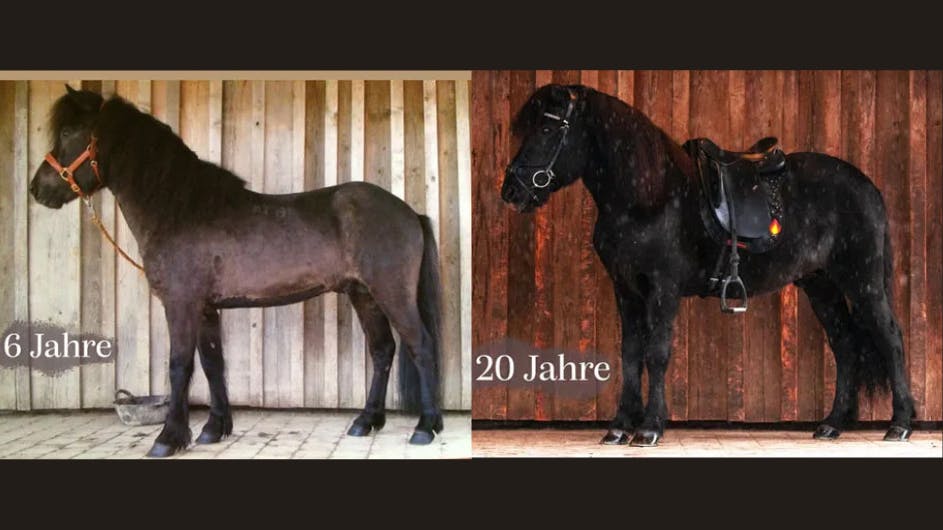
Heljar at 6 and 20 years old. Photos: Marie Conen
Has his personality changed over the years?
No, he is still just as playful and funny, sometimes stubborn and jumpy, as he used to be. However, I am able to conceal this better now due to so many years of training. Mildness of age, no, definitely not!
Maybe you think that Heljar’s good condition is actually not worth mentioning and should be normal for horses his age?
No, this is certainly an exception, especially in top-level sports. However, I know many horses from friends and customers which remain healthy and productive. For example, almost all of the descendants of Blivar von Birkenlund.
One often reads that the one or the other competition horse has been retired from sports and can now enjoy its “well-deserved retirement”. Most of them are younger than Heljar is today. What do you both think about that? What do you think about your future?
I think Heljar’s “big international” career will come to an end with this tournament season. Over the years, he has achieved everything that I have never even dared to dream of. Young horses and talented riders are ahead, we want to make room and don’t want to miss the “jump”.
He is now 21 years old and if training goes on well, 2024 will probably be our last season on the competition track. But90% of our everyday life so far consists of “non-competitive riding”, so not really much will change, except that he won’t have to drive around so much in the trailer from one tournament to another and that he won’t have to practice for his competitions on the oval track. But who knows, maybe in a few years, I’ll still be riding a five-gait program at home – just for fun. To me, he always seems to be very proud and happy afterward.
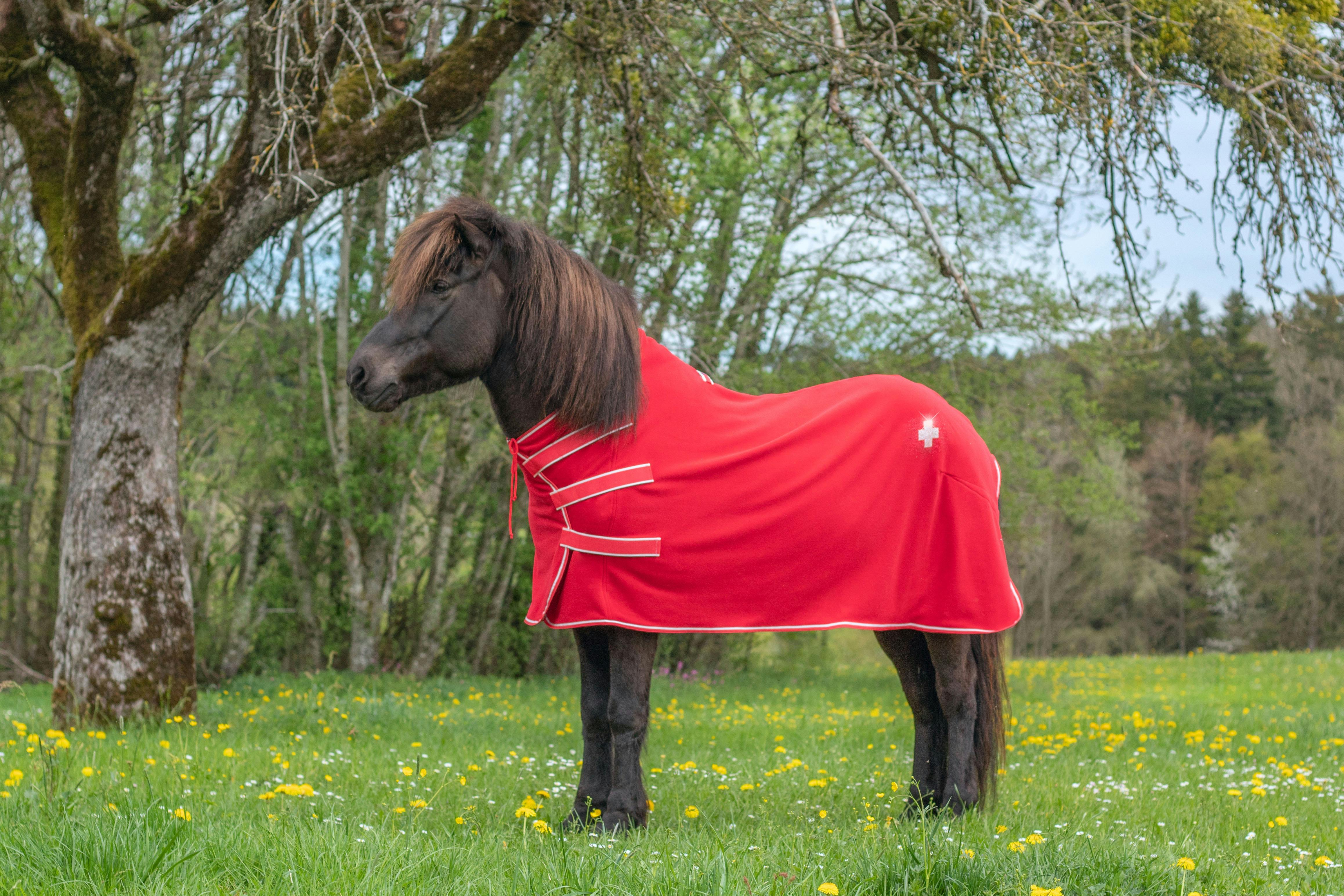
Photo: Marie Conen
How should I imagine such a “well-deserved retirement”? I don’t think a horse that has been that well trained throughout its life is grateful when it “finally” doesn’t have to do anything anymore.
I will keep him physically and mentally busy as long as he is fit and motivated. I owe him so much, I want to give it back to him when he gets older and I want to do everything I can to ensure that he will live a healthy and happy life for many more years.
If we could ask Heljar, how would he describe his dream retirement?
A retirement home in the Engadin and lots of pastures with a few young mares at his side.
And what would you insist on?
A life in a herd with a few nice geldings. I haven’t been able to offer that to him yet. And a mash every day, he loves that so much.
At which age would you describe a horse as “old”?
Age is a flexible term. Do you mean physically old or mentally as well? There are very clear visual signs of aging. Sunken eye sockets, sagging muscles, stiffer movements, grey hair...
I have seen many 15-year-old horses that looked really old and tired. Horses that have never been kept according to their nature, such as only in boxes and without horse company, or that are ridden in a monotonous and stressful way, often age very early in my opinion. The body wears out if you don't take care of it, and so does the mind. We know that from us humans, too.
I would also describe a horse as old if it increasingly isolates itself from the herd due to its advancing age and consequently declines in the pecking order.
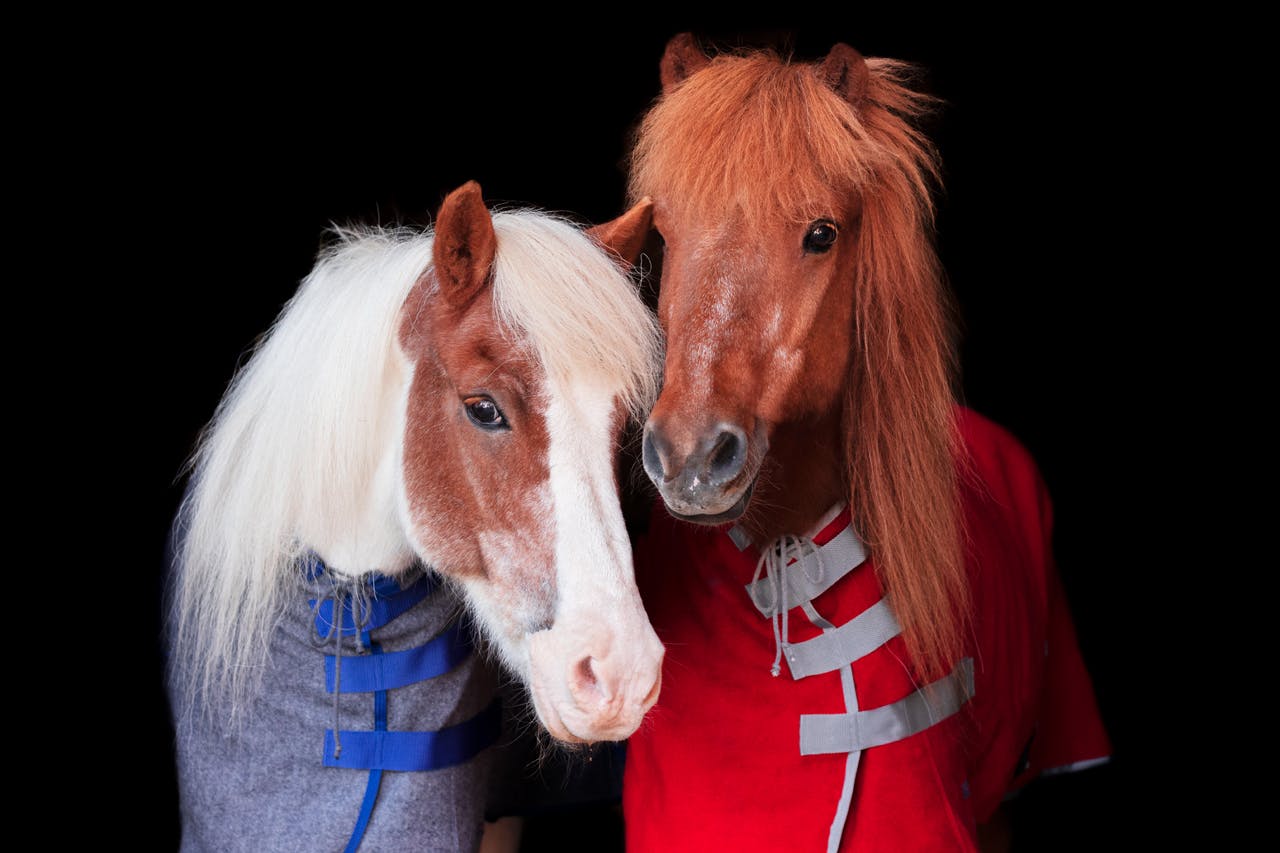
Photo: Marie Conen
What would you recommend to riders so that they can properly assess their aging horse? It shouldn’t be strained for too long or pampered too early.
One must keep one’s eyes open and empathize with the horse. If it gets obviously more and more spiritless and unwilling to ride, one should consider whether it might not enjoy a short groundwork session or a leisurely ride as a hand horse much more.
From the moment on the horse is just “standing around” and also can’t move around freely just as it likes (outdoor grazing), it will break down physically extremely quick. A pasture for old horses can be a good idea to give them a nice retirement.
How do I recognize decline in performance and how do I react to it?
If the decline occurs suddenly, I would first consult a veterinarian to determine if there are any infections or deficiency symptoms present. The stomach is a current topic here but any horse can be examined for “illnesses”.
As always, common sense is important; perhaps the rider is going through a bad mental or physical health phase which then affects the horse. I can clearly feel when the work gets too heavy and monotonous for my horses and then rethink the training each time.
Supplemental feeds can support the organism of the older horse just as a healthy herd with enough opportunities to retreat.
Signs of reduced performance can also include dull fur, diarrhea, fecal water, poor PRT values, and muscle loss. The list could almost go on endlessly.
How do I notice that my horse is no longer rideable and what can we do instead?
There won’t be a specific “Day X” when noticing that the horse can no longer be ridden – unless due to an accident. Usually, it’s a gradual process. If illnesses like spavin or arthritis occur, the decision will be easier than if the horse is just a bit slower and more relaxed.
However, you can engage in liberty work, circus and balance exercises, and walks with the horse to keep it fit and trained even into extreme old age. A former student of mine regularly takes her 37-year-old mare with her as a hand horse and works with her on long reins.
Unfortunately, I often witness in our “throwaway society” that old horses are “cast aside”, among other reasons also due to the costs. The question also arises vice versa. Is it reasonable to keep such a proud and lively animal as the horse alive at all costs just because we humans can’t let them go? I’m not referring to horses that can still eat well on their own but rather to those that are unnecessarily kept alive for a long time despite severe musculoskeletal or metabolic diseases.
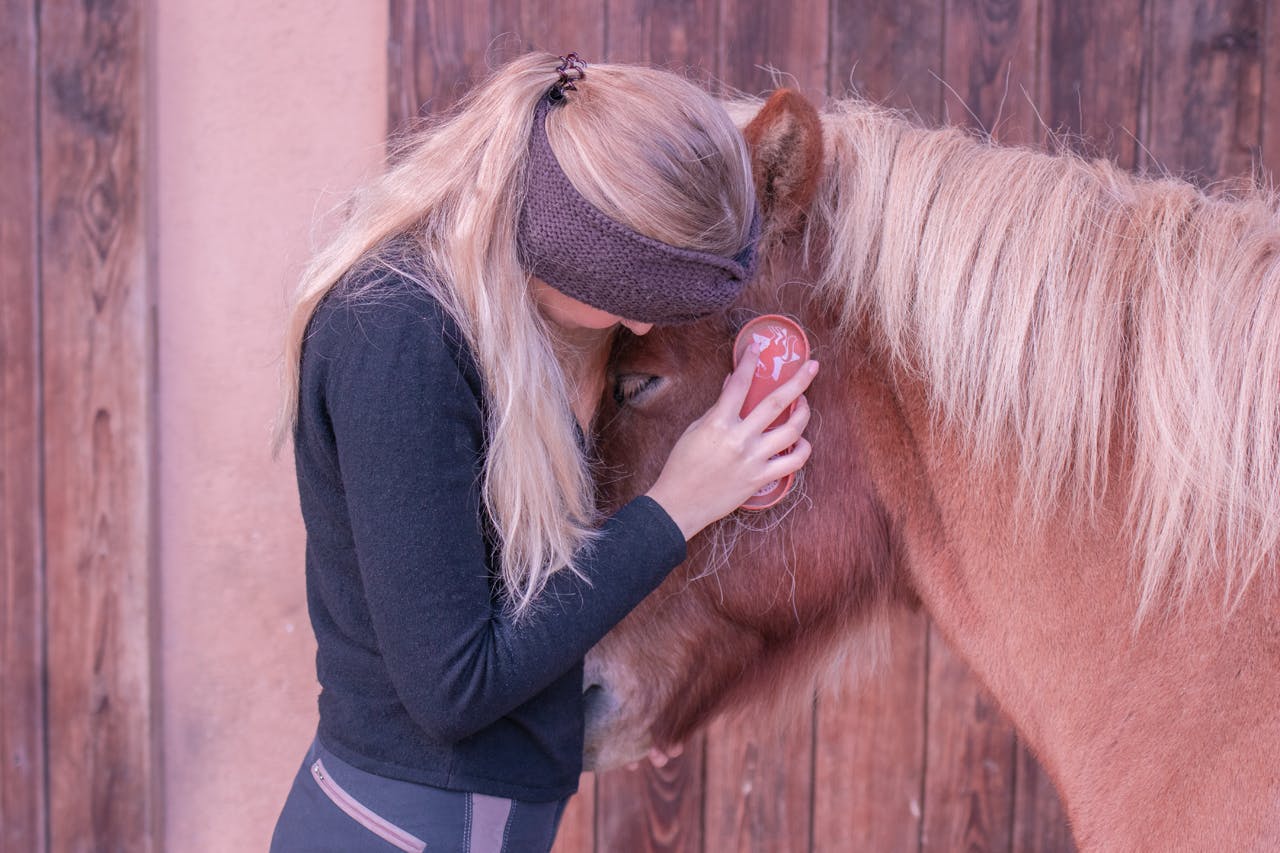
Photo: Marie Conen
How much and what do I work with an old horse?
Old horses are proud, stubborn, and headstrong. This applies to almost all old and very old Icelandic horses I have had the privilege of getting to know in my life. Last year, we had to euthanize the 39-year-old breeding mare of Hafnersholt, Eik frá Hóftúni. Despite her physical ailments, she remained a horse with incredible charisma and an extreme will until her last day.
For Eik, physical care was the highlight of the day at the end of her life. An extra portion of mash and hay cubes, thorough grooming of her scruffy coat, and conveying the feeling of being appreciated and loved. However, one can also over-occupy horses. To my mind, most horses clearly signal whether they still enjoy interacting with us humans or not.
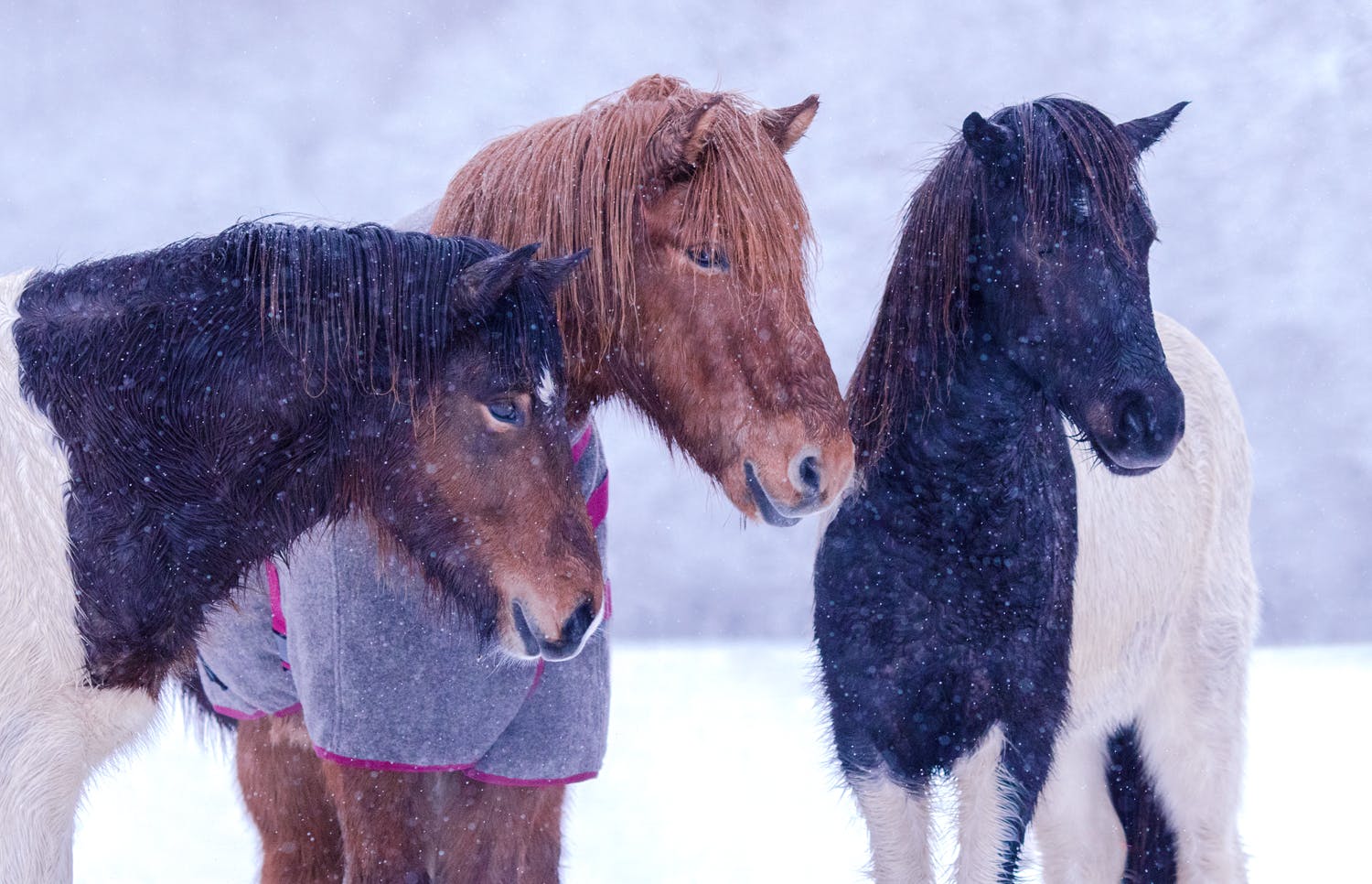
Photo: Marie Conen
What do I offer so that a horse lives happily until the end of its days?
An intact herd, the best food, adequate exercise, short varied training sessions, good general care, enough resting periods, and above all, lots of love and respect.
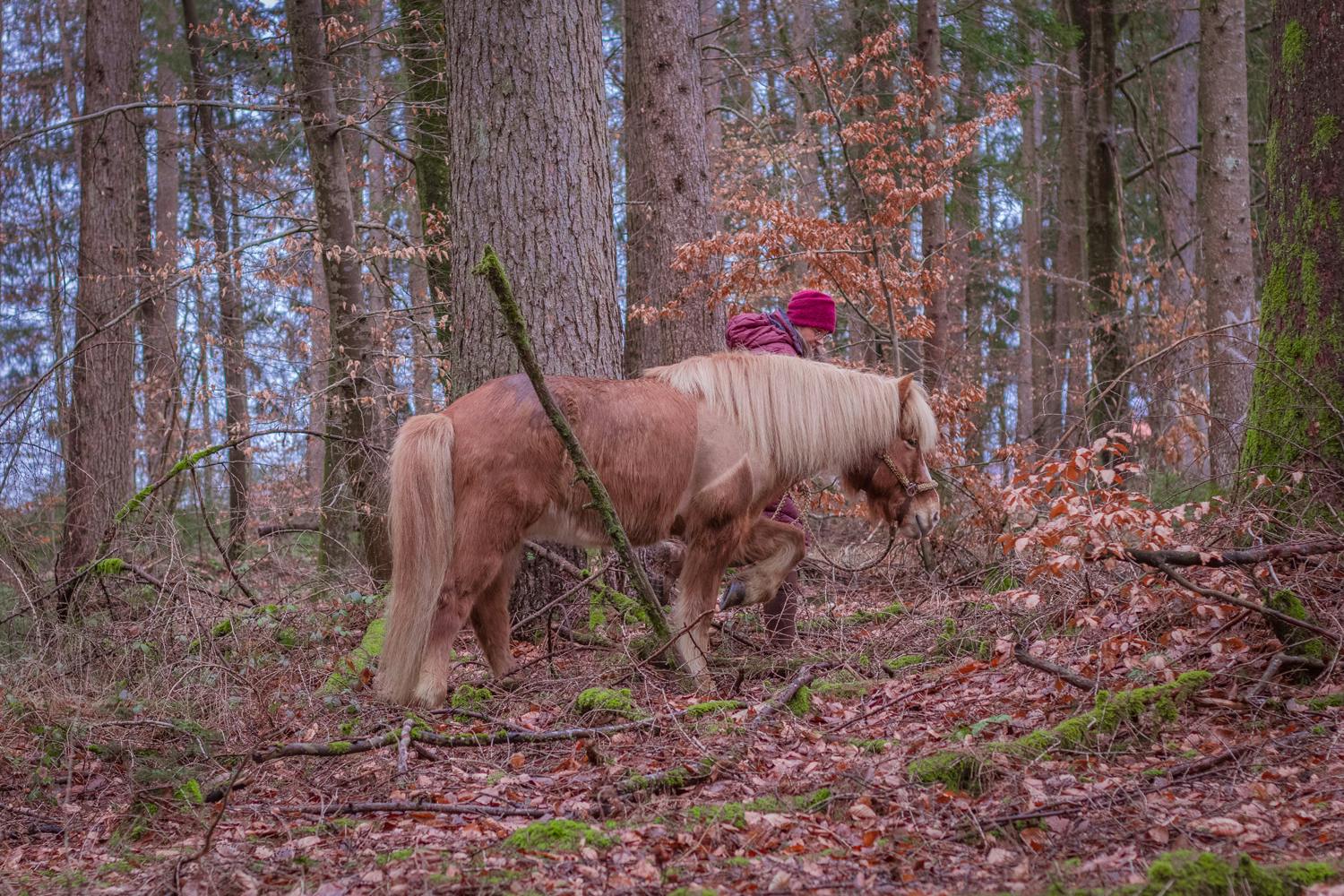
Photo: Marie Conen
You still have a real Methuselah at your farm, Blivar. What does his retirement look like?
Blivar from Birkenlund is now 33 years old and still behaves like a young gigolo when he sees mares.
He came into our possession as a foal, was the 1997 breeding championship winner, and vice- world champion among the six-year-old stallions with our friend Birgir Gunnarson in Seljord, Norway. Countless titles in sports followed. For instance, he was the German champion in five-gait combination in 2007 in Blankenheim with me as its rider, a two-time Central European vice-champion in five-gait, and a nine-time finalist in five-gait at the German championships. Blivar hasn’t been ridden for 7 years now.
He had some problems with arthritis, and his incredible will to walk made it difficult to ride him gently. His nickname is “Mr. 100,000 Volts”. Unfortunately, he can’t be kept with other geldings because he is too dominant. From his large box, he overlooks the farm and is, of course, regularly let out to move freely if he feels like it.
Sometimes, he stands for hours in the same spot and enjoys the sun, the wind, or even a bit of rain. He enjoys everything that happens on the farm and greets all horses with a hearty neigh. Good food and regular grooming, especially during shedding season, are also part of his daily routine. I think, he still believes himself to be a powerful, fiery young stallion.
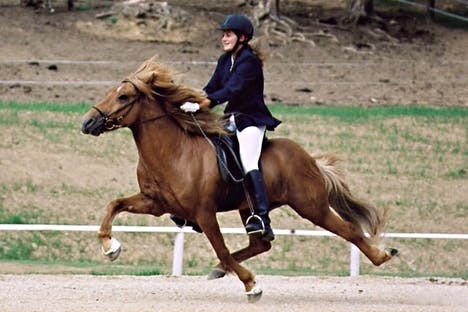
Blivar from Birkenlund and Silvia Ochsenreiter-Egli
Do I need to fear the day my horse turns old? Will our bond lose its quality then? How can I enjoy being with my horse until its last day?
If the animal is valued as a personality and sport companion rather than a means to an end or a “sports device”, there is no need to fear the aging of the horse.
During quiet walks with the old horse, the human can, for example, reminisce about their shared experiences, enjoy its beauty and wisdom, and be grateful for the countless hours they’ve spent together.
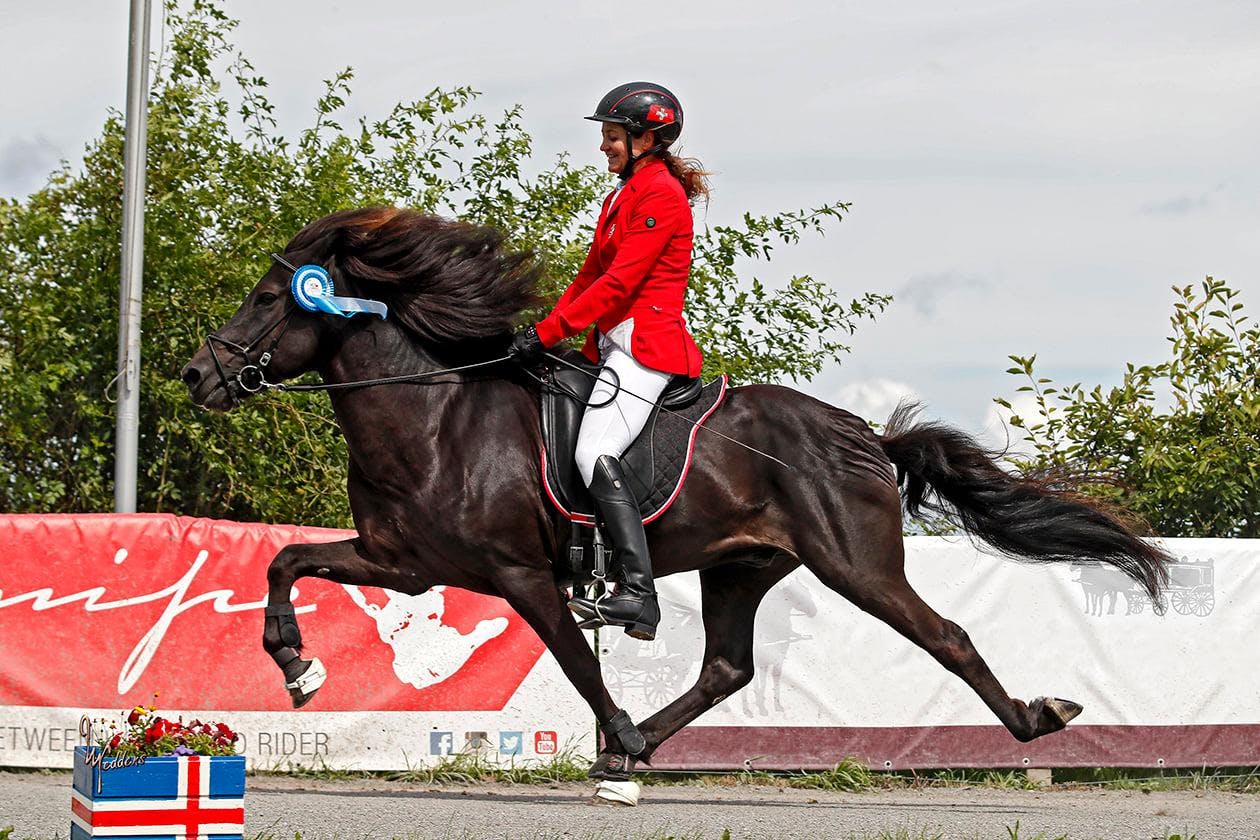
Photo: Krijn Buitelar
We thank Silvia Ochsenreiter-Egli, Veronika Conen from Sportsfreund Studios
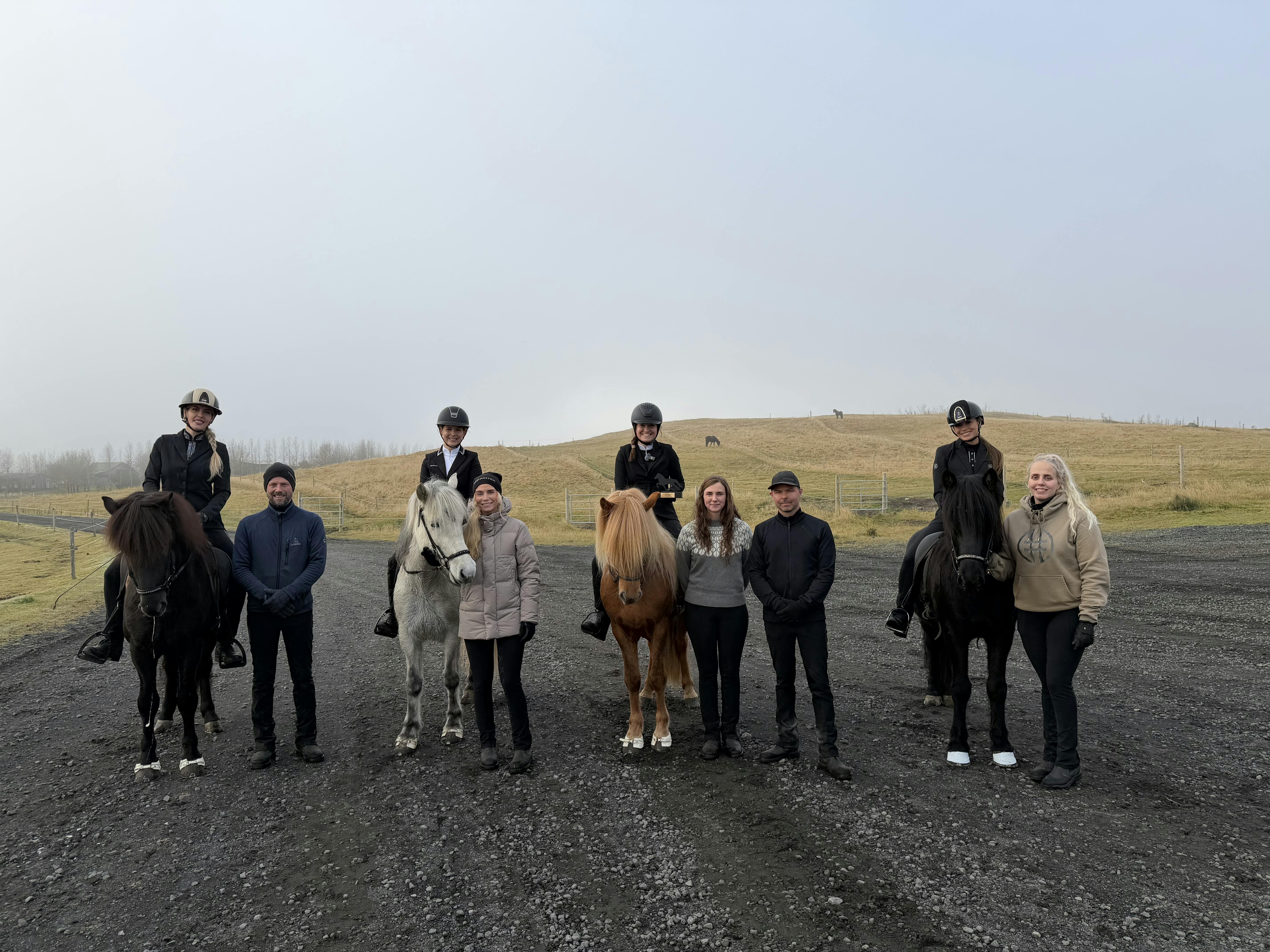
Nov 11, 2025
Influencers' Trip to Iceland Reaches Five Million Views
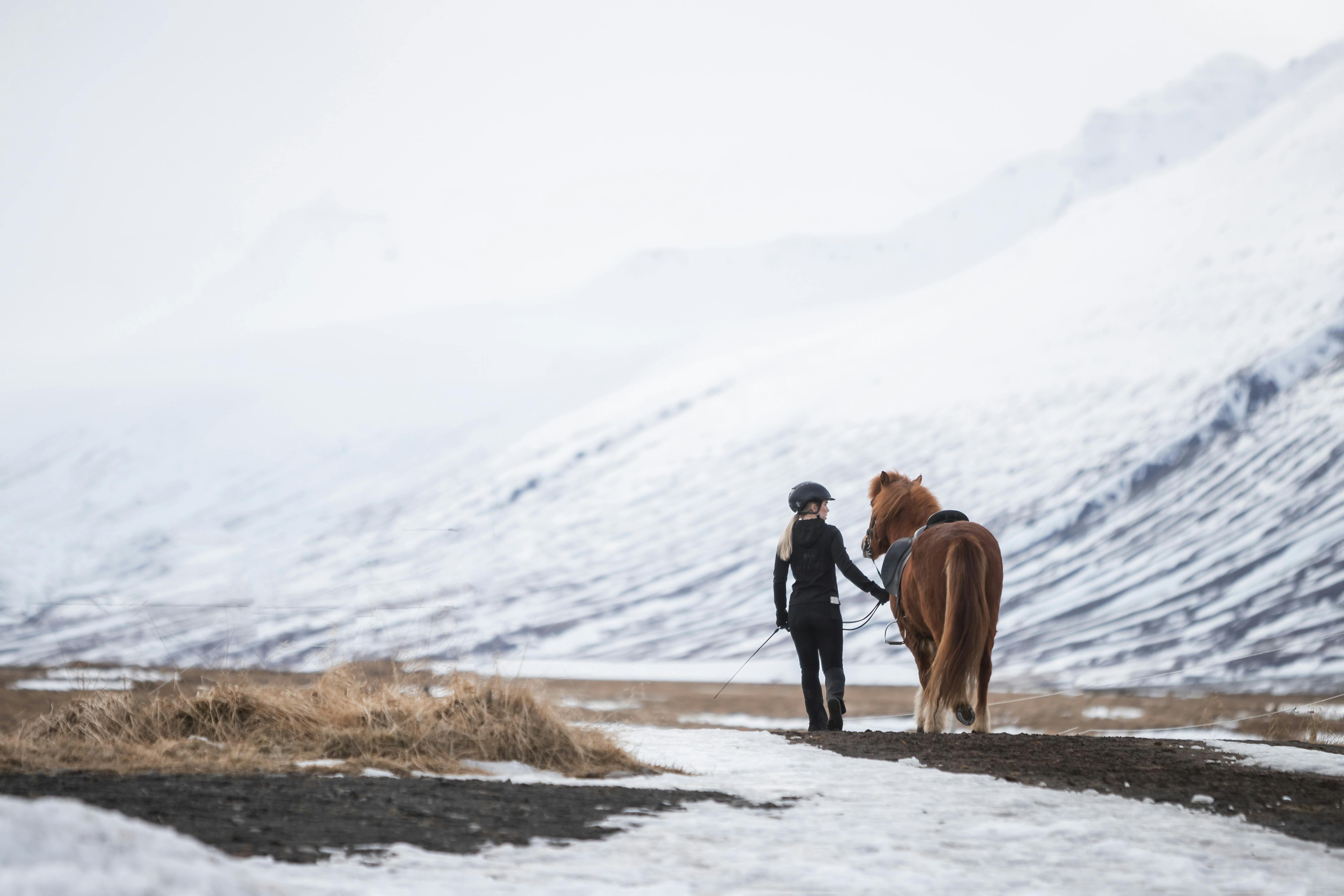
Oct 10, 2025
Free Webinar: Ride into the winter - motivated and healthy horses
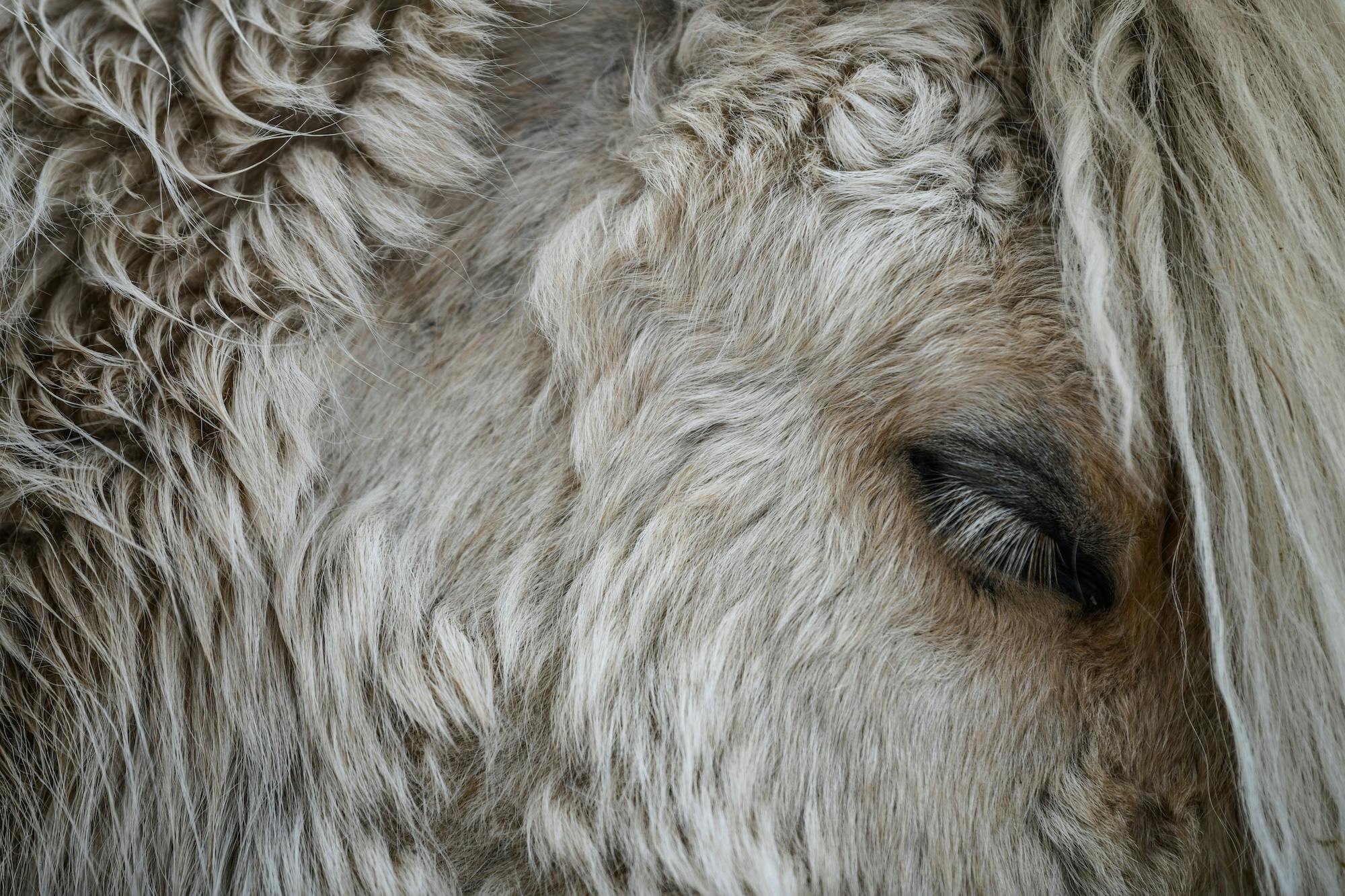
Sep 25, 2025